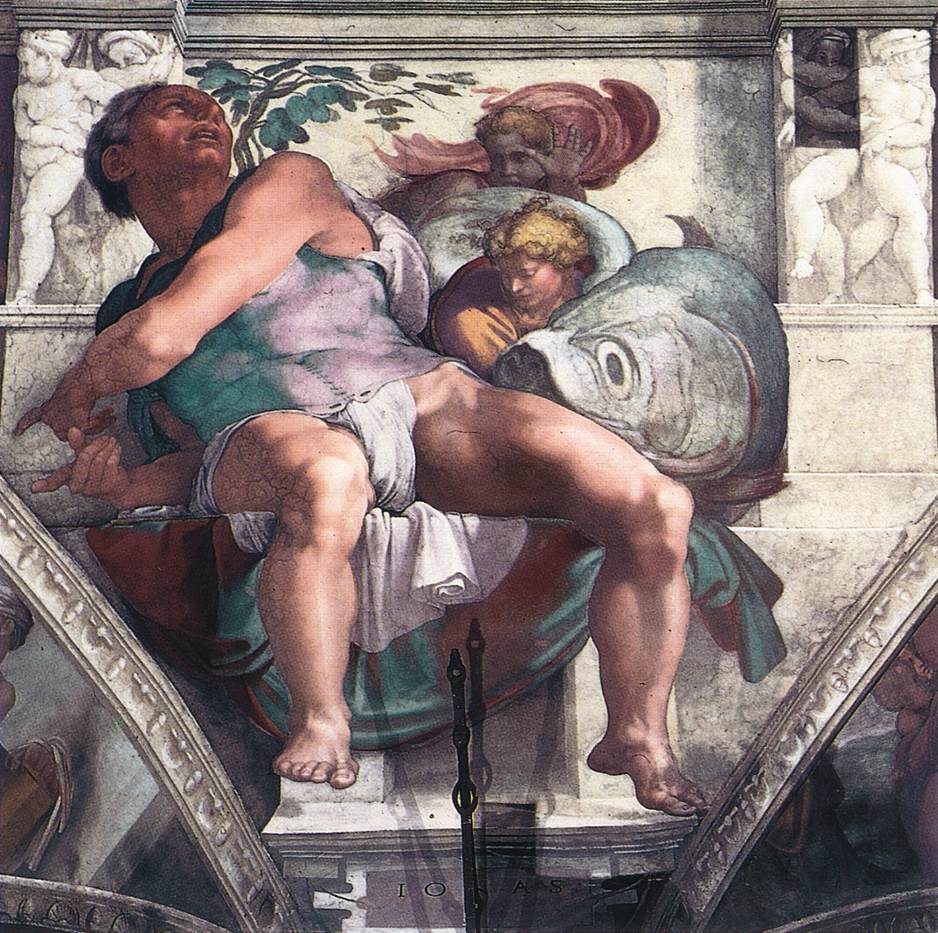A shout-out to Ghost of Shakespeare for the shout-out
In a recent April 30th blog post named "Alas, poor ghost," John Langdon works his magic and weaves insights involving a variety of sources at his blog, Ghost of Shakespeare.
General link to his blog:
https://ghostofshakespeare.com/
Link to the specific post:
https://ghostofshakespeare.com/2022/04/30/alas-poor-ghost/
But I was surprised and delighted to find that he includes mention of my blog posts on the Jonah echo in Hamlet's sea-voyage. [Michelangelo's Jonah on the ceiling of the Sistine Chapel, via Wikipedia. Public domain. Fair use.]
A few paragraphs from the end of his post, John writes,
"Go on, I'll follow thee", Hamlet says to the ghost. Ahab shouts, ". . .let me then tow to pieces, while still chasing thee, though tied to thee, thou damned whale!"**
Later, at the end of his blog post, John includes the ** note:
**For more about whales and Hamlet, including parallels with the biblical Jonah, please see the essays of my friend, Paul Adrien Fried, who has done a great deal of work on biblical references and allusions in Hamlet:
https://pauladrianfried.blogspot.com/2022/04/hamlets-sea-voyage-christ-in-tomb-and.html
What fun, not only to have this blog post mentioned, but also to have it associated with Ahab and the "damned whale"! And all the rest, in John's richly associative style.
My blog post tomorrow will probably be YET ANOTHER reflection on Hamlet's sea-voyage and its similarities with Jonah, but also those troubling elements when Hamlet sends his former friends, turned spies for Claudius, to their deaths, later claiming this does not touch his conscience.
Some of us would love for Hamlet to be the ideal hero, but then he goes and does things like this - sending his former school friends to their deaths. Some of us might like the play to be about an idealized hero character. But maybe Shakespeare wanted his play to be about holding up a mirror and catching the conscience of the monarch?
~~~~~~~~~~~~~~~~~~~~~~~~
Disclaimer: If and when I quote or paraphrase bible passages or mention religion in many of my blog posts, I do not intend to promote any religion over another, nor am I attempting to promote religious belief in general; only to explore how the Bible and religion influenced Shakespeare, his plays, and his age.
~~~~~~~~~~~~~~~~~~~~~~~~
~~~~~~~~~~~~~~~~~~~~~~~~~~~~~~~~~~~~~~
Thanks for reading!
~~~~~~~~~~~~~~~~~~~~~~~~~~~~~~~~~~~~~~
My current project is a book tentatively titled Hamlet’s Bible, about biblical allusions and plot echoes in Hamlet.
Below is a link to a list of some of my top posts (“greatest hits”), including a description of my book project (last item on the list):
https://pauladrianfried.blogspot.com/2019/12/top-20-hamlet-bible-posts.html
I post every week, so please visit as often as you like and consider subscribing.

General link to his blog:
https://ghostofshakespeare.com/
Link to the specific post:
https://ghostofshakespeare.com/2022/04/30/alas-poor-ghost/
But I was surprised and delighted to find that he includes mention of my blog posts on the Jonah echo in Hamlet's sea-voyage. [Michelangelo's Jonah on the ceiling of the Sistine Chapel, via Wikipedia. Public domain. Fair use.]
A few paragraphs from the end of his post, John writes,
"Go on, I'll follow thee", Hamlet says to the ghost. Ahab shouts, ". . .let me then tow to pieces, while still chasing thee, though tied to thee, thou damned whale!"**
Later, at the end of his blog post, John includes the ** note:
**For more about whales and Hamlet, including parallels with the biblical Jonah, please see the essays of my friend, Paul Adrien Fried, who has done a great deal of work on biblical references and allusions in Hamlet:
https://pauladrianfried.blogspot.com/2022/04/hamlets-sea-voyage-christ-in-tomb-and.html
What fun, not only to have this blog post mentioned, but also to have it associated with Ahab and the "damned whale"! And all the rest, in John's richly associative style.
My blog post tomorrow will probably be YET ANOTHER reflection on Hamlet's sea-voyage and its similarities with Jonah, but also those troubling elements when Hamlet sends his former friends, turned spies for Claudius, to their deaths, later claiming this does not touch his conscience.
Some of us would love for Hamlet to be the ideal hero, but then he goes and does things like this - sending his former school friends to their deaths. Some of us might like the play to be about an idealized hero character. But maybe Shakespeare wanted his play to be about holding up a mirror and catching the conscience of the monarch?
~~~~~~~~~~~~~~~~~~~~~~~~
Disclaimer: If and when I quote or paraphrase bible passages or mention religion in many of my blog posts, I do not intend to promote any religion over another, nor am I attempting to promote religious belief in general; only to explore how the Bible and religion influenced Shakespeare, his plays, and his age.
~~~~~~~~~~~~~~~~~~~~~~~~
~~~~~~~~~~~~~~~~~~~~~~~~~~~~~~~~~~~~~~
Thanks for reading!
~~~~~~~~~~~~~~~~~~~~~~~~~~~~~~~~~~~~~~
My current project is a book tentatively titled Hamlet’s Bible, about biblical allusions and plot echoes in Hamlet.
Below is a link to a list of some of my top posts (“greatest hits”), including a description of my book project (last item on the list):
https://pauladrianfried.blogspot.com/2019/12/top-20-hamlet-bible-posts.html
I post every week, so please visit as often as you like and consider subscribing.


Comments
Post a Comment